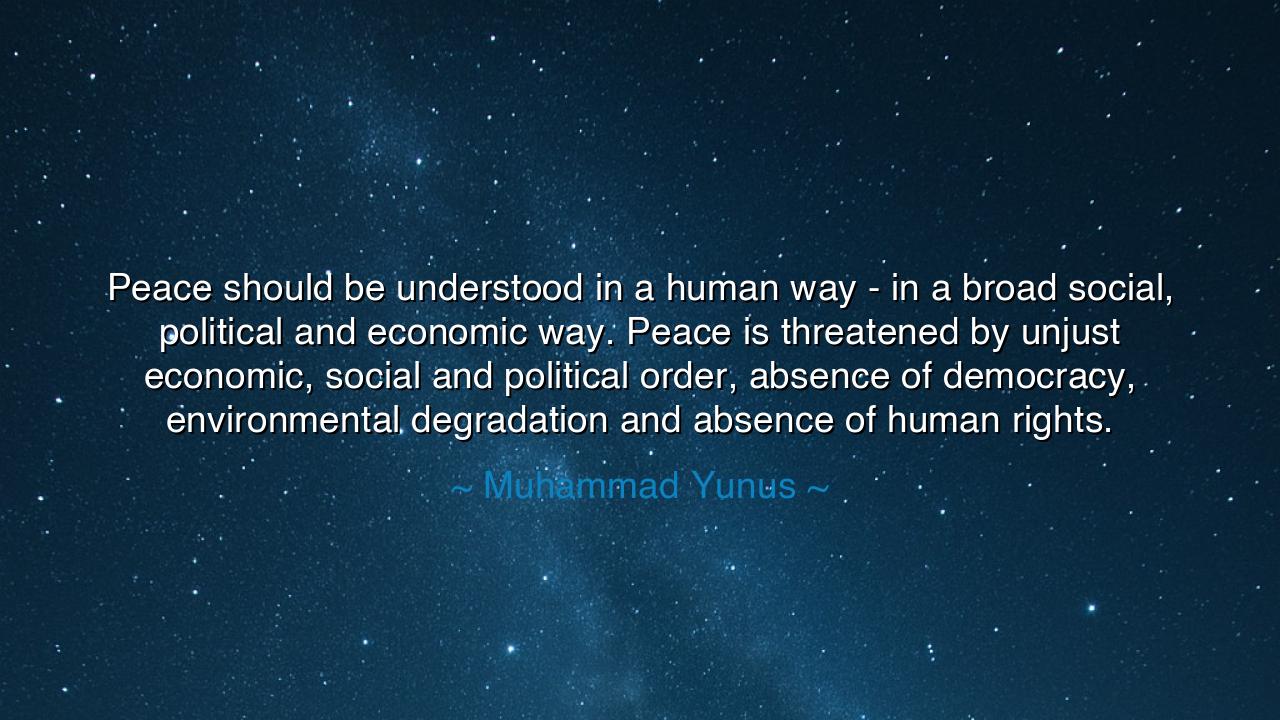
Peace should be understood in a human way - in a broad social
Peace should be understood in a human way - in a broad social, political and economic way. Peace is threatened by unjust economic, social and political order, absence of democracy, environmental degradation and absence of human rights.






Hear the words of Muhammad Yunus, who looked upon the struggles of the poor and spoke with the voice of wisdom: “Peace should be understood in a human way – in a broad social, political and economic way. Peace is threatened by unjust economic, social and political order, absence of democracy, environmental degradation and absence of human rights.” In these words lies not the fragile silence of war’s end, but the deeper, richer meaning of peace—a harmony woven not only of weapons laid down, but of justice upheld, rights honored, and the earth itself cherished.
To speak of peace in a human way is to declare that it is not the domain of rulers and treaties alone, but the daily breath of every man, woman, and child. True peace is not the silence of fear, nor the stillness of oppression. It is the freedom to live with dignity, the opportunity to labor with fairness, the assurance that one’s voice will be heard. Without these, the calm we see is but an illusion, a still pond hiding a storm beneath. Yunus reminds us that peace cannot be narrow—it must be social, political, and economic, touching every realm of human life.
He names the enemies of peace with clarity: unjust order, absence of democracy, environmental degradation, and absence of human rights. Where there is poverty imposed by injustice, the seeds of unrest grow. Where voices are silenced and rulers ignore the governed, rebellion brews. Where the earth is poisoned and stripped, famine and suffering rise. Where human rights are denied, the soul of a people cries out, and that cry will not be stilled. Yunus warns us that peace is fragile unless it rests upon pillars of justice, participation, stewardship, and dignity.
History offers us many lessons. Recall the tale of South Africa under apartheid. The rulers declared that there was peace, for there was no war on their soil. But beneath that claim lay brutality, inequality, and silence forced upon the majority. The world saw through this illusion, and the people rose, demanding true peace—one that included justice, democracy, and human rights. It was only when apartheid fell, and freedom was extended to all, that peace began to take root. This is the truth Yunus declares: peace cannot coexist with oppression.
His own life provides an example as well. By creating microfinance and the Grameen Bank, Yunus sought to bring economic justice to the poor, especially to women in rural villages. He saw that poverty was not only a lack of money, but a lack of opportunity, a lack of voice, a denial of rights. By restoring dignity through access to credit, he gave families a path to stability, and in stability, they found a measure of peace. His work teaches that peace begins not with armies, but with bread in the hands of the hungry, tools in the hands of the laborer, and hope in the hearts of the forgotten.
The lesson is clear: peace is more than the absence of war. It is the presence of justice. It is the balance of power shared fairly, the health of the earth maintained, the rights of every soul respected. A world that ignores these truths may enjoy moments of quiet, but that quiet will soon be shattered. A world that honors them will enjoy not only silence but song, not only rest but flourishing.
Practical action must follow. Work not only to end conflict, but to address its roots: fight poverty, protect the earth, defend democracy, and uphold human rights wherever they are threatened. Do not believe that peace is secured by armies alone—it is secured by teachers, by farmers, by activists, by ordinary people who demand justice in their lives and communities. Each act of fairness, each defense of the weak, each protection of the earth is a brick in the temple of peace.
Thus, Muhammad Yunus’s words must be carried as a torch: that peace is human, broad, and inseparable from justice. Let no generation forget this truth. For if we seek only the silence of war’s end, we will find ourselves deceived. But if we seek the peace of justice, dignity, and care for the earth, then we will build a world that stands firm, not for a moment, but for ages.






AAdministratorAdministrator
Welcome, honored guests. Please leave a comment, we will respond soon